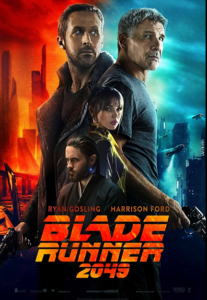
 Exploring and expanding on the universe created back in 1982, “Blade Runner 2049” is a worthy sequel. After waiting more than 30 years for questions to be answered, the script, credited to Hampton Fancher, who co-penned the original adaptation, working here with Michael Green (“Logan”), provides explanations while commenting on social issues relevant to our time.
Exploring and expanding on the universe created back in 1982, “Blade Runner 2049” is a worthy sequel. After waiting more than 30 years for questions to be answered, the script, credited to Hampton Fancher, who co-penned the original adaptation, working here with Michael Green (“Logan”), provides explanations while commenting on social issues relevant to our time.
Having been sworn to secrecy prior to being shown the film, I’ve been forbidden to reveal character details. Over the years, ”Blade Runner” has provided grist for more than one think-piece and review as fans speculate as to hidden meanings. There have been several versions of the film some released theatrically. Originally, “Blade Runner” was a theatrical failure, but found cult and then classic status via the magic of home video. Much of the initial focus was on the stunning, ahead of their time visuals, but thereafter, the themes began to weave their way into popular culture.
Based on the characters in Philip K. Dick’s novel “Do Androids Dream of Electric Sheep,” actor turned writer/producer Hampton Fancher re-envisioned the story as a neo-noir. A detective story ultimately manifested itself complete with a voice over that may have been an after-thought. Subsequent cuts of the film abandoned the voice over and deepened the mysteries.
In the original, Harrison Ford, fresh off his turn as a leading man/action hero in “Raiders of the Lost Ark,” took on ex-police officer Rick Deckard, the moody state sponsored killer of rogue replicants. That story was set in 2019 Los Angeles, which really bears little resemblance to our time or world—cars fly, buildings have reached monolithic stature resembling the ancient Pyramids, the richest among us have fled the garbage filled planet to live off-world, and a corporate visionary named Tyrell has created biologically engineered beings that provide slave labor. But, as we all know by now, the slaves have begun to rebel.
Flash forward to the year 2049, Earth has hardly improved. Some kind of catastrophic event has caused the collapse of world economies. The Tyrell Corporation that was formerly responsible for a new era of progress with its Nexus series replicants has gone bankrupt leaving a new visionary, Niander Wallace (a typically tweaked Jared Leto), to take over production. His replicants obey.
But older Nexus replicants still must be hunted, which is the job of a new blade runner merely referred to as K (or perhaps “Agent K”) played by a stoic Ryan Gosling. His job is not unlike that of his predecessor: he’s a killer.
Obviously, revealing anything more would spoil the film, suffice to say that the formula of the original is somewhat followed but with new permutations that arguably improve on the story. This means “Blade Runner 2049” builds meaningfully on the themes introduced back in 1982. And these themes still feel fresh and relevant especially because today, unlike back in the 1980s, we rely more and more on artificial intelligence and digital assistants than ever before.
The fact that the technology of “Blade Runner 2049” seems credible and links well with the previous film is remarkable. Credit has to go to Ridley Scott and his amazing team who served as futurists in crafting the environments back in 1982. And credit must be given to new director Denis Villeneuve (“Arrival”) and his team, which includes gifted cinematographer Roger Deakins and production designer Dennis Gassner, for perfectly linking the two films visually. The gritty look of the first film is carried into this one, and the passage of time has given them some freedom to improve on the technology. It is a visual delight.
“Blade Runner 2049” is a long film. For fans, it might not be long enough. Sure to be a massive seller when it is released for home purchase, where it will be painstakingly dissected and analyzed, this is a critic-proof movie. But for the casual viewer, it might prove to be a bit of a labor, which isn’t to say the film isn’t worth the time. Viewers certainly get their money’s-worth, but re-visiting the original prior to seeing “Blade Runner 2049” is a good idea. Having, at least, a basic understanding of the story and the universe is important, otherwise, some viewers might be a little confused. Of course, the fact that this is a seamless continuation, albeit set 30 years later, die-hard fans will be left very pleased.

